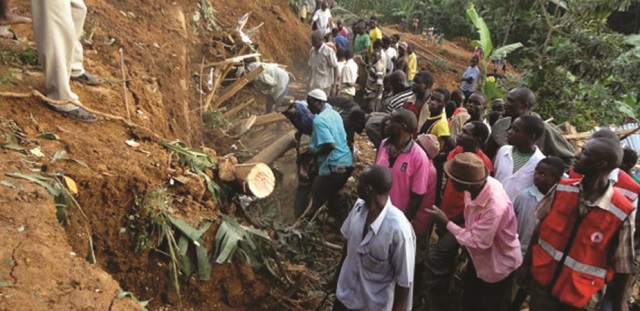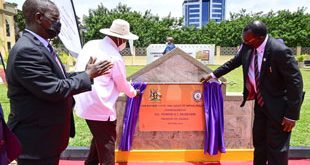
Kampala, Uganda | GODFREY SSALI | The Parliamentary Forum on Disaster Risk Reduction and Mitigation has challenged government to increase the budgetary allocation towards disaster response and management programs as a way of protecting Ugandans against floods.
Addressing a press conference at Parliament Monday 26, March 2018, organized by Civil Society Budget Advocacy Group (CSBAG) and OXFAM Uganda, the Chairperson of the Forum and Isingiro South Mp Alex Bakunda Byarugaba, said that government can save up to eight times the money it spends on reactive responses to floods by investing in disaster preparedness.
He noted that though government has allocated 77 billion shillings to the contingency fund, the proposed allocation is below the 0.5 percent stipulated in the public finance management Act.
“Scientific research indicates that if government invests $1 in disaster preparedness, it saves at least $8, which would have been spent on disaster response,” said Byarugaba.
Uganda has experienced episodes of severe floods in the districts of Mbarara, Kasese, Rubanda and in the Northern part of the country since 2015. The disasters have left close to 20 people dead while thousands are missing, injured or displaced.
Floods are being caused by high rate of forest cover loss, poor waste management, and continued encroachment on wetlands, poor social and environmental safeguards as well as limited knowledge and access to information on disaster preparedness, which has promoted vulnerability of communities to floods.
In Kasese district, River Nyamwamba displaced hundreds of families in 2015 when the river burst its banks because of siltation, unsustainable human activity and poor agricultural practices.
Sylvester Masereka, a resident of Kasese advised government and individuals to plant trees along the river banks to curb soil erosion which contributes to flooding of the river.
The forum further recommended that government gazettes one day every month for the public to participate in community work and as well stipulate two days in a year for planting of trees country wide to control the many disasters that come with floods.
Disaster preparedness programmes
Since 1990, Uganda has lost 15% of its forest cover due to degradation and destruction of natural forests. Similarly, wetlands have continued to be destroyed by encroacher, which explains the continued flooding of Kampala and other cities across the country.
Additionally, there is limited understanding and usage of weather and climate patterns by the communities which would have enabled people to make decisions and develop solutions to climate related shocks and stresses.
Byarugaba who is also chairperson of the parliament committee on natural disasters advised the metrological department to work with the media to avail user friendly meteorological information translated into various local languages to the public to prepare Ugandans against weather-related emergencies.
For his part, Makindye East Member of Parliament Ibrahim Kasozi accused the office of the prime minister and the Ministry for Relief and Disaster Preparedness for continuously leaving out Kampala city during the planning and allocation of funds to disaster prone districts.
Although Kampala district is one of the areas that is most prone to floods,. Kasozi, explained that the capital is usually left out on all disaster preparedness programs. “Kampala is not covered under the national disaster plan,” he said.
 The Independent Uganda: You get the Truth we Pay the Price
The Independent Uganda: You get the Truth we Pay the Price

